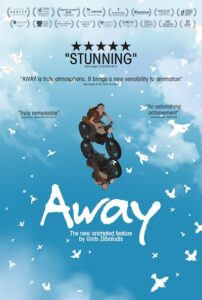Gints Zilbalodis: Doing it all
by Mark ReynoldsLatvian prodigy Gints Zilbalodis’ critically acclaimed debut animated feature Away is a stunning, dialogue-free film about a boy travelling across an island on a motorcycle, trying to escape a dark spirit and return home. Along the way, he makes a series of connections with different animals and reflects on how he may have ended up on the island. A solo project, Gints embarked on the film with no formal training and on a shoestring budget, experimenting with music apps and computer programs to create the score. Following on from its cinema release in the UK and Ireland in August 2020, it is now available on digital download and streaming platforms.
Mark: How would you pitch your film and its themes in 25 words or fewer?
Gints: A story about a boy who’s on a contemplative journey across a strange island trying to find his way back home.
Is Away chiefly an allegory for human mortality and the fragility of all life on our planet?
For me it’s about a character who feels like he’s alone and is determined to find a connection with others.
The simple drawing of the main character, and his determination, curiosity, resourcefulness and vulnerability all put me in mind of Saint-Exupéry’s The Little Prince. Was that a touchstone for you at all?
I read it when I was very young and I remember enjoying it, but I haven’t revisited it since then. Maybe it left some seeds in my subconscious.
The style of the Studio Ghibli films is evident too. In what ways were they and other Japanese animations an influence? Which animated films and directors do you count among your favourites?
I love all the Studio Ghibli films. I have also been hugely influenced by the works of Fumito Ueda.
Were the landscapes based on actual locations at all, or purely from the imagination?
The landscapes are a mix of various real and imagined places. Some of the inspirations are Iceland, Lanzarote and Japan.
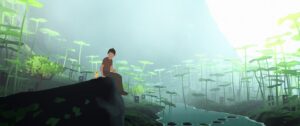 Away by Gints Zilbalodis” width=”300″ height=”126″>How long did it take you to make the film, from initial conception to the finish, and what were the steps along the way?
Away by Gints Zilbalodis” width=”300″ height=”126″>How long did it take you to make the film, from initial conception to the finish, and what were the steps along the way?
Everything took about three and a half years, which actually isn’t that long for an animated feature. Because I was doing everything myself, I was able to skip some of the traditional production steps. I didn’t have a complete script or even any storyboards. Instead I discovered the story directly while animating.
The core theme of Away is a reflection of its creation process. There are a lot of similarities between the journey that the main character goes on and my experiences making the film on my own.”
Were there moments during the process that you felt you were being pursued by a dark spirit and feared you may never reach your final destination? What were the biggest hurdles you faced?
The core theme of Away is a reflection of its creation process. There are a lot of similarities between the journey that the main character goes on and my experiences making the film on my own. I think that it’s important for filmmakers to use personal experiences in their work. Making a feature film singlehandedly definitely comes with its challenges. If there’s a problem you have to deal with it yourself and I found myself working all the time and not taking enough breaks. I had to keep reminding myself that the creative process is a marathon rather than a sprint.
Did you release the individual chapters as short films as you went, before bolting them together as a feature?
That was the plan initially. I sent an earlier version of the first chapter to film festivals, but I realised that the film works much better when seen in its entirety.
What gave you confidence to tackle the music soundtrack along with everything else? How did you go about it, and which composers or musicians do you regard as influences?
This was the first time I’ve done the score myself. I have no experience with making music, but I figured this could actually be beneficial in this case, because I wanted to avoid a traditional orchestral score. I thought that a more atmospheric, minimalist score would be better suited for Away. I learned how to make music by experimenting a lot. At first the professional music creation software was a bit too overwhelming for me, so I used some apps on my phone which are designed with beginners in mind. Once I understood the basics, I moved on to my computer which has a lot more ways to manipulate the sounds. I started making the music while the animation wasn’t finished yet. This allowed me to integrate it better into the edit and let music guide the rhythm of the film. I’ve already started making the music for my next film even before the script is finished. Some of the musical influences were Philip Glass, Max Richter, Jóhann Jóhannsson, Trent Reznor and Atticus Ross.
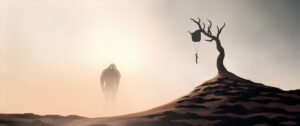 Away by Gints Zilbalodis” width=”300″ height=”126″>How did you go about sourcing other sound effects?
Away by Gints Zilbalodis” width=”300″ height=”126″>How did you go about sourcing other sound effects?
Most of the sounds were found in libraries, but I recorded my own sounds too. The boy’s breathing, sighing, gasping, etc. is me. I couldn’t find a sound for birds flapping their wings, so had to use pillows, which when shaken quickly create a surprisingly similar sound!
How did the project differ from the previous films you have made?
The schedule was much longer, but my day-to-day was pretty much the same. I worked on one chapter at a time which felt almost like making short films.
Will Flow – an expansion of your short film Aqua – definitely be the next feature you release? Why did you want to revisit that particular story, and what stage is in now at?
It’s not really an expansion of the short film but rather an adaptation. The premise is very similar. Rather than the short, which just deals with a cat’s fear of water, the feature will be about a group of characters and how they interact.
Are there any other projects you’re longing to get started on?
I can only focus on one film at a time so I’m not set on what I’ll do next, but I’d like to try to make a film with dialogue.
You’ve said you’d like to collaborate with others next time around. Which processes will you reluctantly – or gladly – give up? How big a team do you envisage, and what roles do you aim to fill?
I’ll be writing, directing, scoring, finding the look of the film and the layout of the shots. Other people in our team will be doing character animation, simulations, sound design and the more technically challenging stuff. It will probably be a fairly small operation, which I think will allow us to experiment and be bolder with our choices.
Would you consider adapting someone else’s graphic novel or work of fiction, or will you stick exclusively with your own vision?
As long as I have the opportunity, I’ll prefer to work on my own stories. It’s important for me to have freedom to explore and discover the story while making it.
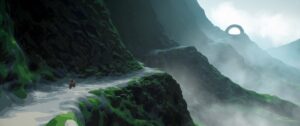 Away by Gints Zilbalodis” width=”300″ height=”126″>And are there any plans for a wordless graphic novel of Away?
Away by Gints Zilbalodis” width=”300″ height=”126″>And are there any plans for a wordless graphic novel of Away?
Not right now.
You’ve previously made a short live-action film too. Might something happen in that direction?
I’d definitely like to try to do something in live action again someday, but currently I feel like animation gives me more freedom to express myself.
Which live-action directors do you most admire?
Alfonso Cuarón, Paul Thomas Anderson, Martin Scorsese and Akira Kurosawa are iconic.
Which other filmmakers, artists or authors from Latvia should we be looking out for?
Maybe I’m a bit biased because I’m currently working with him, but I think you should look out for the work of Matīss Kaža.
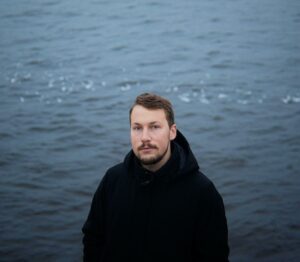 Gints Zilbalodis is a filmmaker, animator and cinephile based in Riga. Away won the prestigious Contrechamp Award at Annecy International Animation Film Festival 2019 and is now released digitally by Munro Films. It can be purchased from Apple TV, iTunes, Sky Store, Amazon, Google, Microsoft, Rakuten, Sony and Curzon Home Cinema from 18 January.
Gints Zilbalodis is a filmmaker, animator and cinephile based in Riga. Away won the prestigious Contrechamp Award at Annecy International Animation Film Festival 2019 and is now released digitally by Munro Films. It can be purchased from Apple TV, iTunes, Sky Store, Amazon, Google, Microsoft, Rakuten, Sony and Curzon Home Cinema from 18 January.
munrofilmservices.co.uk
vimeo.com/gints
gzilbalodis
@gintszilbalodis
@munrofilms
Mark Reynolds is a freelance editor and writer, and a founding editor of Bookanista.
@bookanista
wearebookanista
bookanista.com/author/mark

